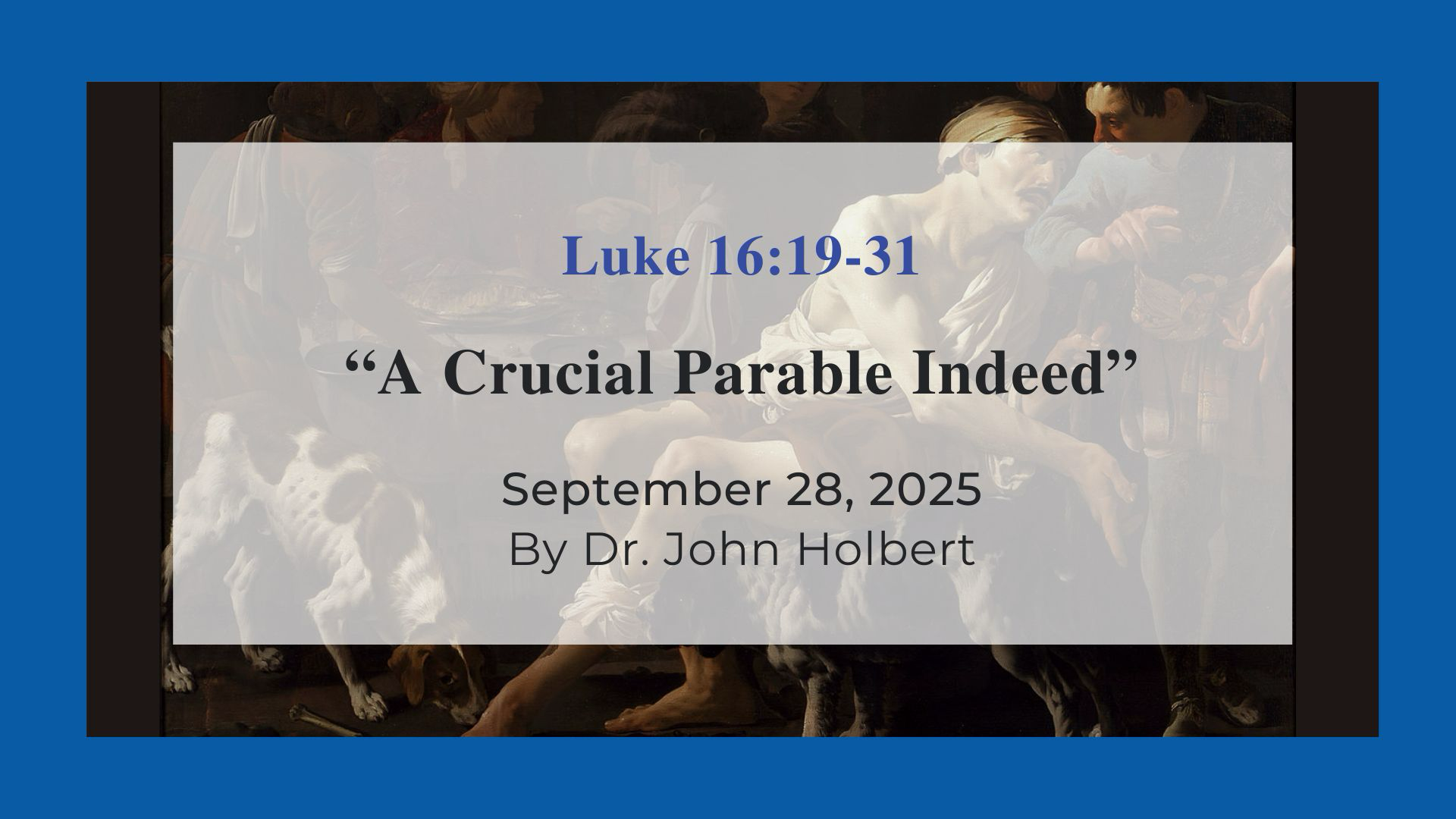A Crucial Parable Indeed - Reflections on Luke 16:19-31, Pentecost 16, Year C
by John C. Holbert on Saturday, June 14, 2025

I have long loved this passage from Luke. As a reader particularly concerned with the Hebrew Bible, I have found this text especially helpful when it comes to demonstrating the importance of careful attention to the older testament. I know well that many readers of this text find in it validation for their particular understanding of the afterlife, and the ways one either gets there or finds themselves heading in the other direction, where a life of torment awaits, and an unairconditioned torment at that! I do not find such speculation significant, nor do I imagine that the telling of this story was Luke’s way of “proving” the existence of heaven and hell. The story told is first that: a story, a narrative that bears important ideas that demand careful consideration.
The parable of the rich man and Lazarus is directed at the Pharisees, who are called in Luke 16:14 “money lovers.” Whether or not this accusation is historically accurate is hardly significant for Luke’s Gospel. He always contrasts the poor with the rich, especially in the Sermon on the Plain (Luke 6:20, 24); the Pharisees here are the “rich,” who are in the main, according to Luke, not interested in the plight of the poor. Jesus, however, promises a complete reversal of human expectation with the coming of the rule of God; in fact, that is his central concern. Those who follow Jesus can expect nothing less than a complete change of life, where the poor are blessed and the rich are “sent empty away” (Luke 1:53). It must be acknowledged that many Pharisees in the first century were, without doubt, seriously interested in the condition of the poor—Jewish literature of the day is replete with that concern. But, of course, the Gospels are hardly unbiased writing. The Jews—at least some of them—are the antagonists of Jesus and here portrayed as such.
The story is beautifully written. “There was a certain rich man,” dressed in purple and wonderful linen garments, who feasted sumptuously every day. But “there was a certain poor man,” Lazarus, sitting at the rich man’s gates, covered with terrible sores. “He longed to be filled with what fell off the rich man’s table.” Instead, the man’s dogs came to lick his sores, the poor man being so weak from hunger he could not drive the beasts off. Then the poor man died, and was carried off by angels to Abraham’s bosom. And then the rich man died, and after elaborate mourning, flowery eulogies, and a vast marble tomb, he was dropped into Hades, suffering torments. From his painful state, he lifted his eyes and saw Abraham and Lazurus in his bosom.
Being used to giving orders in his life, he calls out, “Father Abraham, have mercy on me! Send Lazarus down here to dip his finger into water and cool my tongue; I am suffering in this flame!” (Luke 16:24). No dice, says Abraham! You got your goods in life, while Lazarus received only evil. So, he is comforted now, while you suffer. Not only that, there is a great divide between us; you are there, while we are here, and there is no passing from one place to the other.
But I have five brothers, says the rich man. Lazarus can bear witness to them so they will not come to this place of torment (Luke 16:28). Abraham’s answer to to his plea is crucial. “They have Moses and the prophets. Let them listen to them” (Luke 16:29) “No, father Abraham! But if someone should come to them from the dead, they will repent” (Luke 16:30). The word used for “repent” is the familiar metanoein, which always describes the correct response to hearing God’s word through the prophet. The rich man has clearly failed to hear the Hebrew Bible clearly enough, and has done no repenting during his lifetime. He paid no attention to Lazarus, starving and suffering at his very gates, as he drove his Maserati out of the garage each day. But the rich man now says that if only Lazarus should come back from the dead, his brothers will see the light and repent and avoid his torment.
But the final reply is fascinating and important. “If they do not listen to Moses and the prophets neither will they be convinced if someone rises from the dead!” (Luke 16:31). The verb used here, “rise,” (anistemi) is regularly used for the resurrection of Jesus. The point is plain; all that one needs to find repentance is full attention to “Moses and the prophets,” that is, the essence of the Hebrew Bible, the demand for justice and righteousness in the community of the faithful. If one is not concerned with that, even a resurrection is not able to be convincing to such a one.
I have often used this tale as proof that all that one needs to discern in the biblical record may be found in the Old Testament, that what Jesus teaches is merely a reiteration of Moses and the prophets. True Christianity, as I understand it, does not consist in the acceptance of the truth of Jesus’s resurrection, but in the call of God, through the prophet Jesus, to follow the ways of justice and righteousness as are found commonly in the Hebrew Bible. Is that not finally the essence of our Christian faith?
